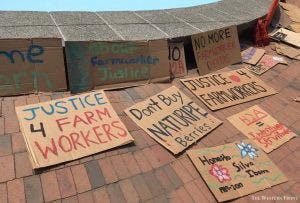Students for Farmworker Justice is working to spread information about a U.S Department of Labor program called H-2A. // Photo courtesy of Students for Farmerworker Justice
Makani MosesImagine a scorching hot July day and a migrant farmer works in an orchard filling a bucket with cherries from the break of dawn to early evening. The farm shortens work breaks and doesn’t provide access to sanitation and clean water.
And now imagine being from a foreign country and not having the resources or outside support to advocate for yourself and fellow workers.
These are the types of situations and conditions that a student-led Western group, Students for Farmworker Justice, are working to raise awareness for and to prevent.
“What we’re doing is supporting local farmworkers,” Leah Olver, co-lead officer of Students for Farmworker Justice, said. “We focus on not telling people what to do or how to act, but to support people to act on their own to help people that are being affected.”
On Aug. 5, Students for Farmworker Justice along with Community to Community, a Bellingham nonprofit organization that also supports migrant workers, will both be part of a march from Everson to Sarbanand Farms in Sumas on the anniversary of the death of Honesto Silva Ibarra.
Xolotl Edgar Franx, civic engagement program coordinator for Community to Community, said Ibarra was a Sarbanand Farms migrant worker who died in August 2017, which led to an investigation of the farms.
Franx said Sarbanand Farms was issued a fine of $150,000 by the Washington State Department of Labor and Industries for 13 cases of violations of employment standards. They were able to lower the fine to $73,000 due to Ibarra having a preexisting diabetic condition, which was determined to be the cause of death.
However, Franx said the fine decrease was not deserved.
“Any decent person would know working like that as a diabetic and not being able to get access to a doctor leads to death,” Franx said. “Any person could figure that out.”
More recently, Students for Farmworker Justice is working to spread information about a U.S Department of Labor program called H-2A.
The H-2A visa program is a federally-funded program that allows domestic agricultural farmers to temporarily hire migrant foreign farm workers when there aren’t enough local workers to fill the workforce.
Ibarra was a worker under H-2A.
To the Students for Farmworker Justice, the poor conditions the workers are put through are well below the standard to what farmworkers should have.
“Because they’re on temporary visa, they don’t have a huge ability to advocate for themselves for fear of deportation or harassment,” Olver said.
“One of the biggest issues migrant workers face is not having those easy connections to lawyers or union organizers that have the resources to make an official case,” Bobby Murphy, a former volunteer at the Youth Migrant Project in Burlington, said.

Olver said Students for Farmworker Justice has previously organized picket lines outside of stores to boycott produce distributed by Driscoll’s, the world’s largest berry company.
One of their goals was to attract the attention of Driscoll’s and organize communication between farms and workers to establish collective bargaining rights.
After three years, the boycotts in the Bellingham community and around the country gained enough attention to have Driscoll’s establish updated policies regarding farmworkers.
Students for Farmworker Justice also works closely with Community to Community.
“Under these programs, the power dynamic is totally shifted to these contractors and to employers,” Franx said. “And it’s all about maximizing profit. It’s the berry and food industry, and it’s not even about feeding people, it’s about the commodities and who can sell their berries the cheapest.”
However, Olver said hiring foreign farmers who may not have a wide understanding of their rights as workers has big implications on how they are treated.
“One difference between programs like the H-2A and farmworkers that live in the United States year-round is they have a lot more connections to outside organizations and to other people,” Olver said.
Franx said that even though massive progress has been made, there is still more work to be done.
“It’s compared to slavery, the way the whole program is working,” Franx said. “You promise the workers all these things, but when they get here they’re being exploited and abused. If you complain you get fired and blacklisted from coming back to the country.”
Sarbanand Farms was unable to be reached for comment.





